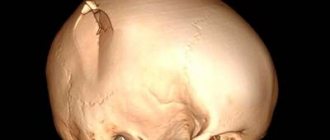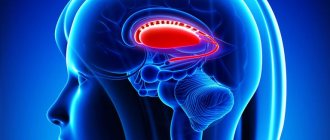The feeling of anxiety sometimes greatly interferes with a person’s life and joy. The individual begins to overly concentrate on his worries and doubts instead of directing his efforts to achieve a meaningful result. This state significantly suppresses the will, deprives one of moral strength and desire to do anything, since any steps seem meaningless. A constant feeling of anxiety is incredibly exhausting for the psyche, weakens the nervous system, and often makes you feel uncontrollable anxiety. It is important to know how this condition can be overcome, what its features are and the prerequisites for its occurrence.
It's okay, I'm just worried and a little scared
One of the preceding stages of the appearance of neurosis can be the unreasonable occurrence of anxiety and worry.
A feeling of anxiety is a tendency to experience a situation, to be constantly worried. Depending on the character of the person, his temperament and sensitivity to stressful situations, this condition can manifest itself in different ways. But it is important to note that unreasonable fears, anxiety and worry, as a pre-stage of neurosis, most often appear in tandem with stress and depression.
Anxiety, as a natural feeling of a situation, not in a hyper form, is useful for a person. In most cases, this condition helps to adapt to new circumstances. A person, feeling anxious and worried about the outcome of a particular situation, prepares as much as possible, finds the most suitable solutions and solves problems.
But as soon as this form becomes permanent, chronic, problems begin in a person’s life. Everyday existence turns into hard labor, because everything, even the little things, scares you.
In the future, this leads to neurosis, and sometimes to phobia, and generalized anxiety disorder (GAD) develops.
There is no clear boundary of transition from one state to another; it is impossible to predict when and how anxiety and a feeling of fear will turn into neurosis, and that in turn into an anxiety disorder.
But there are certain symptoms of anxiety that appear constantly without any significant reason:
- sweating;
- hot flashes, chills, trembling throughout the body, tremors in certain parts of the body, numbness, severe muscle tone;
- chest pain, burning stomach (abdominal distress);
- fainting, dizziness, fears (of death, madness, murder, loss of control);
- irritability, a person is constantly “on edge”, nervousness;
- sleep disturbance;
- any joke can cause fear or aggression.
How to reduce anxiety in everyday life
Look for the cause of anxiety
Anxiety cannot be ignored, says psychologist Michael Tomek. The most common cause is thoughts about the future. If you have imagined a negative scenario, think about how you will act in such a situation, which will help you solve this problem. This way you will understand that you can cope with possible difficulties, and therefore there is no reason to worry.
According to Stoic philosophy, all phenomena in the world are divided into those controlled and beyond human control. The Stoics are confident that worrying about what is beyond our control is pointless and it is better to direct all our energy and attention to the things we control. “Of existing things, some are in our power, others are not. We have in our power opinion, desire, desire, deviation - in a word, everything that is ours,” states Epictetus in the book “A Brief Guide to the Moral Life”
Bring your attention to your body
Experts from the Anxiety and Depression Association of America (ADAA) say that physical activity helps a person reduce anxiety. When playing sports, you are focused on your physical condition and all resources are aimed at maintaining it. One workout can help relieve symptoms for a few hours, and regular exercise can significantly reduce them over time.
Reduce the number of alerts
One of the factors of anxiety may be frequent use of gadgets. You're on edge when you constantly have notifications popping up on your phone. Leave only the most important ones - you can simply check the rest of the chats and news resources periodically.
Solve math problems and get creative
If an anxious state prevents you from doing your usual activities, puzzle your brain. This could be exercises in physics, mathematics or playing chess. You can count backwards in your head, add and multiply random numbers.
If mathematical problems are less interesting to you, take up drawing or playing music. The main thing is to shift attention to solving a specific problem and direct all other resources to it.
Watch your breath
Scientists at Stanford University have identified a connection between breathing and our emotional state: the shallower we breathe, the higher the level of anxiety and restlessness. Therefore, deep breathing practices must be performed periodically.
Simple breathing exercises:
- Inhale and exhale deeply in 4 counts for 2 minutes. Engage diaphragmatic breathing, which activates the whole body.
- Inhale for 4 counts, hold your breath for 8 and exhale through your mouth for 16.
- Pinch your right nostril and inhale through your left, close both nostrils and hold your breath. Exhale through the right nostril.
Record your experiences in writing
Describe how you feel and explain the reason for your anxiety. After re-reading this entry in a few hours, you will look at the situation from the other side, as if this is not happening to you. In this state, new ideas and ways to solve problems may come to you.
Allow yourself to rest
Anxiety can arise from constant rushing and the thought that you are not getting anything done. An intense work schedule and multitasking can increase your anxiety level. Accordingly, you need to allow yourself to rest, and take short breaks during the working day. This will also help you improve your work-life balance.
Anxiety neurosis - the first steps to madness
Anxiety neurosis can manifest itself differently in different people, but there are main symptoms and features of the manifestation of this condition:
- aggressiveness, loss of strength, complete despair, anxiety even in a minor stressful situation;
- touchiness, irritability, excessive vulnerability and tearfulness;
- fixation on one unpleasant situation;
- fatigue, low performance, decreased attention and memory;
- sleep disturbances: shallow, there is no lightness in the body and in the head after waking up, even the slightest overexcitement deprives one of sleep, and in the morning hours, on the contrary, there is increased drowsiness;
- autonomic disorders: sweating, pressure surges (mostly downward), disruption of the gastrointestinal tract, rapid heartbeat;
- a person during a period of neurosis reacts negatively, sometimes even aggressively, to changes in the environment: a decrease in temperature or a sharp increase, bright light, loud sounds, etc.
But it should be noted that neurosis can manifest itself both openly in a person and hidden. There are often cases when a trauma or situation preceding a neurotic failure occurred a long time ago, and the very fact of the appearance of an anxiety disorder has only just taken shape. The nature of the disease itself and its form depends on environmental factors and the person’s personality.
Where do anxious experiences come from - the underlying causes
The feeling of fear arises for various reasons, be it meeting strangers, speaking in front of a large audience, etc. This phenomenon comes in several types: short-term, quickly passing and mild. In the latter case, a person can easily cope with the problem on his own.
But if anxious experiences accompany a person for a long time and prevent him from living a normal life, therapy is necessary . The most important thing here is to understand the causes of anxiety, and then engage in treatment.
Among the main reasons for this condition are:
- Genetic predisposition . If one of your close relatives had a similar disease, then there is a high probability that it will be inherited.
- Childhood traumas . Misunderstandings between parents and frequent domestic conflicts can lead to the child withdrawing into himself and refusing to make contact, thereby locking all problems within himself. With age, problems become more and more numerous, they have no way out and put pressure on the psyche. This becomes the cause of various disorders, including panic attacks, when a person is afraid that childhood traumas will be repeated.
- Severe stress . This can include sudden mental shocks, for example, the death of a relative, severe trauma. All this can trigger panic attacks. In most cases, stress only in combination with other experiences leads to attacks of fear for no reason. Especially if there were previously signs of anxiety.
- Brain dysfunction . Some scientists believe that panic disorders occur due to imbalances in the brain's neurotransmitters. Therefore, a person is often tormented by fear and anxiety.
There are cases when, against the background of illnesses or character traits, several types of anxiety may appear at once : social and panic. Against this background, depression may occur. For example, a person is afraid of large crowds of people, so he remains lonely. His social needs are not met, which causes depression and dissatisfaction.
We recommend that you read: Diarrhea during panic attacks - what does this symptom mean?
GAD - fear of everything, always and everywhere
There is such a concept as generalized anxiety disorder (GAD) - this is one of the forms of anxiety disorders, with one caveat - the duration of this kind of disorder is measured in years, and affects absolutely all areas of a person’s life.
We can conclude that it is precisely this monotonous state of “I’m afraid of everything, I’m afraid always and constantly” that leads to a complex, painful life.
Even ordinary cleaning of the house, not done according to schedule, upsets a person, going to the store for a necessary thing that was not there, calling a child who did not answer on time, but in his thoughts “they stole, killed”, and many other reasons why There is no need to worry, but there is anxiety.
And all this is generalized anxiety disorder (also sometimes called phobic anxiety disorder).
The Danger of Feeling Anxious
With mental illnesses, anxiety gets out of control and can become inadequate—occur in situations where there is no real external danger. In such cases, anxiety itself becomes the cause and mechanism for the development of diseases: psychosomatic conditions, anxiety and depressive disorders, endogenous and organic diseases.
It is also necessary to know that during anxiety, the ability to think rationally and adequately analyze incoming information is reduced. This is why all psychologists recommend never making radical decisions at the “peak of anxiety.”
And then there’s the depression...
Anxiety-depressive disorder, as a form of neurosis, according to experts, by 2021 will take second place after coronary heart disease among disorders that lead to disability.
The states of chronic anxiety and depression are similar, which is why the concept of TDR appeared as a kind of transitional form. The symptoms of the disorder are as follows:
- mood swings;
- sleep disturbances for a long period;
- anxiety, fears for yourself and loved ones;
- apathy, insomnia;
- low performance, decreased attention and memory, inability to learn new material.
There are also vegetative changes: increased heartbeat, increased sweating, hot flashes or, conversely, chills, pain in the solar plexus, gastrointestinal disorders (abdominal pain, constipation, diarrhea), muscle pain and more.
Anxiety-depressive syndrome is characterized by the presence of several of the above symptoms over several months.
Symptoms of anxiety
Anxiety is often referred to as an unusual feeling of restlessness in the soul. Why does it appear this way? The answer lies in physiology.
In the generally accepted understanding, the soul lives in an area inside the chest, located in the solar plexus area. A large number of nerve nodes are concentrated here, so the state of anxiety is accompanied by physical manifestations in this place.
An unusual feeling in the soul is one of the main signs of anxiety. This happens because the neural connections responsible for safety constantly send impulses, irritating the nerve nodes of the solar plexus. An unusual heavy sensation occurs.
Symptoms of anxiety:
- spontaneous contraction of cheekbones,
- a persistent sensation in the solar plexus area and on the fingertips,
- increased heart rate and breathing,
- increased sweating,
- muscle contraction,
- persistent state of tremor.
Constant anxiety affects concentration, it interferes with concentration and confuses thoughts. An important characteristic of disturbing states is emotional coloring. Moreover, this property does not always have a negative connotation.
Chronic
If the feeling of fear and anxiety is chronic, it may be accompanied by several accompanying symptoms:
- throbbing headache
- dizziness,
- nausea,
- indigestion - loss of appetite or constant overeating,
- cardiopalmus,
- increase or decrease in blood pressure,
- shiver,
- physical activity,
- dry mouth.
Unconscious
Even an unconscious feeling of panic and anxiety has its own symptoms and often gives rise to certain mental and physiological conditions:
- depression,
- insomnia,
- apathy,
- abdominal pain,
- irritability,
- menopause.
Causes of anxiety
The causes of anxiety disorders cannot be divided into one clearly defined group, because each person reacts to one or another circumstance in life differently.
For example, a certain decline in the exchange rate of the currency or ruble may not worry a person during this period of life, but problems at school or college with peers, colleagues or relatives can lead to neurosis, depression and stress.
Experts identify some causes and factors that can cause anxious personality disorder:
- dysfunctional family, depression and stress suffered in childhood;
- problematic family life or the inability to arrange it in time;
- predisposition;
- female sex - unfortunately, many representatives of the fair sex are already by nature predisposed to excessively “take everything to heart”;
- Experts have also identified some dependence on the constitutional composition of the human body: obese people are less predisposed to the appearance of neuroses and other mental disorders;
- setting the wrong goals in life, or rather exaggerating them, already the initial failure leads to unnecessary worries, and the ever-accelerating pace of modern life only adds fuel to the fire.
What do all these factors have in common? The importance and significance of a psychotraumatic factor in your life. And as a result, a feeling of anxiety and fear arises, which from a normal natural form can develop into a hypertrophied, causeless one.
Features of anxiety “for no reason” - constant worry about something that even theoretically cannot happen. Sometimes, a person simply saw a similar situation on TV, with neighbors or relatives, and the slightest reminder of any similar facts already raises the alarm “what if this happens now.”
But it must be said that all similar factors only predispose, and the rest of the twisting occurs in a person’s thoughts.
Risk factors and causes
It is worth understanding that disturbing conditions do not arise in a person without a reason. But many people face the problem of identifying the origins of a disturbing condition. This phenomenon is called causeless anxiety. What is the deep nature of this phenomenon?
Typical triggers
The origins of the feeling of fear and anxiety in the soul are various factors.
- There is a real threat. Unexpected sudden event.
- An upcoming significant event with an unknown outcome - an exam, a public speech, a wedding, an interview.
- Doing something in the past. This event can “haunt” even if it happened in distant childhood.
- Losing someone or something significant. Without this person or object, the usual course of life in the future is impossible.
- An unresolved problem, postponed “until better times.”
- Experiencing emotional shock. After some event in the conscious mind, a person convinces himself that everything is fine, but the subconscious mind does not agree with this. Dissonance occurs, which provokes the development of disturbing states in the soul.
- A conflict situation that has been going on for a long time. A person subconsciously feels a threat and expects dangerous situations to arise unexpectedly.
- Excessive alcohol consumption. Alcohol-containing drinks negatively affect the functioning of all body systems, including disruption of processes that affect emotional well-being. A person does not experience joy, feels unreasonable fear and anxiety. The situation often develops into the development of a depressive state.
- Physiological disorders in the functioning of the hormonal system.
Our brain, in any threatening, unusual, inexplicable situation, constantly gives a signal in the form of a disturbing feeling. But he does not always “tell” us the reasons. This applies to anxiety states.
More often, a person associates his emotions with a specific event. But there are times when it is difficult to determine the connection. In such situations, it is customary to call anxiety unreasonable. But there is a reason for it, but it is not clear to man.
"Unreasonable" fears
Common reasons for “unreasonable” anxiety:
- a sudden change in the usual, established way of life,
- the presence of an insoluble problem situation,
- health problems,
- stress,
- exposure to bad habits - alcohol, smoking, drugs, gambling.
Mental illness
A constant, persistent feeling of fear or severe anxiety may indicate the presence of a mental illness. Anxiety and worry are often symptomatic manifestations of specific illnesses.
Internal anxiety and unreasonable fear can signal the presence of mental disorders and illnesses:
- phobias,
- hypochondria,
- hysteria,
- obsessive-compulsive disorders,
- vegetative-vascular dystonia (VSD),
- irritable bowel syndrome (IBS),
- panic attacks.
Anxiety syndrome is clearly manifested in neurotic diseases. Thus, anxiety neurosis (generalized anxiety disorder) is characterized by severe mental tension in the form of unmotivated and unreasonable anxiety.
Often the feeling of anxiety worsens in the evening and does not go away at night. The reason for this manifestation is often our instinctive mechanisms, which were developed evolutionarily.
In primitive society, night was the most dangerous time, when deadly predators went hunting. Over many millennia, the body has developed a system for mobilizing the body in the dark. This system has been preserved in humans in the form of instinct. In some individuals, it manifests itself in the form of causeless anxiety at night, in the evening, or when falling asleep.
Complex of manifestations
Symptoms of anxiety disorders are divided into two groups:
- Somatic symptoms . Characterized by pain, deterioration of health: headaches, sleep disturbances, darkening of the eyes, sweating, frequent and painful urination. We can say that a person feels changes on the physical level, and this further aggravates the anxious state.
- Mental symptoms : emotional stress, a person’s inability to relax, fixation on the situation, constantly turning it over, forgetfulness, inability to concentrate on something, inability to remember new information, irritability and aggression.
The transition of all of the above symptoms into a chronic form leads to such unpleasant consequences as neurosis, chronic depression and stress. Living in a gray, scary world, where there is no joy, no laughter, no creativity, no love, no sex, no friendship, no delicious dinner or breakfast... all these are the consequences of untreated mental disorders.
Symptoms
Anxiety manifests itself in three groups of signs:
- Psychological: a feeling of fear, internal tension and anxiety, in severe cases - panic, obsessive thoughts of alarming content.
- Physiological autonomic reactions: redness or paleness of the skin, dry mucous membranes, palpitations and shortness of breath, sensations of pressure in the chest or abdomen, “waves throughout the body,” fluctuations in blood pressure, etc.
- Behavioral: freezing and numbness, restless tossing and restlessness, attempts to escape, lack of normal sleep.
The first two groups are necessarily present, the last (behavioral) may be absent if anxiety is not very pronounced.
Feelings of anxiety with sensations of heaviness in the chest or in the heart area indicate an anxious-depressive state. Such complaints are most pronounced in the morning and may subside in the evening. The presence of such complaints indicates severe overexcitation of the nervous system, and not the presence of lung or heart disease.
Help needed: diagnostics
Diagnosis should only be made by a specialist. The symptoms show that all anxiety states are intertwined; there are no clear objective indicators that can clearly and accurately separate one form of anxiety disorder from another.
Diagnosis by a specialist is made using color techniques and conversation. A simple conversation, a leisurely dialogue, which is a “secret” survey, will help reveal the true state of a person’s psyche. The treatment stage begins only after the correct diagnosis has been made.
Do you suspect the development of anxiety disorders? You need to contact your local physician. This is the first stage.
Then, based on all the symptoms, the therapist will tell you whether you need to see a psychotherapist or not.
When searching for a doctor, you need to take into account several rules: do not rush into dubious advertisements; it is better if the psychotherapist has recommendations and experience; During the sessions it should be comfortable; if the patient feels constrained, there will be no result.
All interventions should be made only depending on the degree and severity of the disorder. It is important to note that treatment is tailored only individually. There are techniques and general recommendations, but the effectiveness of treatment is determined only by the correct approach to each patient separately.
Therapy and prevention
What to do if there is constant fear and anxiety? An approximate algorithm of actions looks like this:
- Self-help.
- Completing cognitive behavioral therapy sessions.
- Use of medications.
Important! If the doctor recommends antidepressants, then the use of the pills should be carried out according to a strict schedule. You need to take medications, regardless of whether relief occurs or not, for a maximum of 6-12 months.
If, in addition to blood pressure, the doctor prescribes a sleeping pill, then you should take it no longer than 30 days. If the doctor also prescribes sedatives, then they must be taken for 1.5 months.
As part of drug therapy, the patient is prescribed the following:
- Antidepressants (SSRI and SSRI groups). The main drugs are Citalopram, Ecitalopram, Paroxetine, Sertalin, Duloxetine, Venlafaxine. You can be treated with them without fear - they do not cause addiction. Depending on the severity of the clinical picture, the doctor may recommend increasing or decreasing the dosage;
- Benzodiazepines (sedatives). Unlike AD, they have a faster effect. Recommended drugs are Diazepam, Alprazolam, Lorazepam, Oxazepam, Bromazepam;
- Sleeping pills (prescribed only if anxiety is combined with insomnia). The main drugs are Zopiclone, Zolpidem.
How to overcome fears, worries and anxiety
To get rid of fear, anxiety and anxiety today there are two main approaches.
Psychotherapy sessions
Psychotherapy sessions, alternative name for CBT (cognitive behavioral therapy). During such therapy, the causes of mental vegetative and somatic disorders are identified.
Another important goal is a call for proper stress relief and learning to relax. During sessions, a person can change his stereotypical thinking; during a calm conversation in a conducive environment, the patient does not fear anything, which is why he opens up completely: calmness, a conversation that helps to understand the origins of his behavior, realize them, and accept them.
Next, a person learns how to deal with anxiety and stress, get rid of unreasonable panic, and learns to live. The psychotherapist helps the patient accept himself, understand that everything is fine with him and his environment, that he has nothing to be afraid of.
It is important to note that CBT is carried out both on an individual basis and in groups. This depends on the severity of the disorder, as well as the patient's willingness to be treated in one way or another.
It is important that a person must consciously come to a psychotherapist; he must at least understand that this is necessary. Forcibly pushing him into the office, and for longer also forcing him to talk - such methods will not only not give the desired result, but will also aggravate the situation.
In combination with psychotherapy sessions, a massage session and other physical procedures can be performed.
Medicines for fear and anxiety - a double-edged sword
Sometimes the use of medications is practiced - these are antidepressants, sedatives, beta blockers. But it is important to understand that medications will not cure anxiety disorders, nor will they be a panacea for getting rid of mental disorders.
The purpose of the medication method is completely different; drugs help you keep yourself under control and make it easier to bear the severity of the situation.
And they are not prescribed in 100% of cases; the psychotherapist looks at the course of the disorder, the degree and severity, and already determines whether there is a need for such medications or not.
In advanced cases, strong and fast-acting medications are prescribed to obtain the fastest effect in order to relieve an anxiety attack.
Specialists tell their patients what these medications are, why they are needed, and what course is needed in this particular case. It is important to convey to the patient that once you have started taking medications, you should not suddenly stop taking them.
The combination of two methods gives results much faster. It is important to consider that a person should not be left alone: family, his relatives can provide irreplaceable support and thereby push him towards recovery. How to cope with anxiety and worry - video tips:
Is it possible to cope with a panic attack with medication?
Many of those who have experienced the symptoms of a panic attack in their lives believe that they can resist the attack with the help of medications. This understandable desire to take care of one’s own well-being has another side - the very absence of a medicine at hand can provoke panic for some. But it is often not possible to effectively stop a panic attack with the help of medications, since they take time to take effect. Usually the effect of the drug is noticeable half an hour after administration, but during this time a panic attack can end as suddenly as it began. However, in the case of prolonged and intense attacks, medication cannot be avoided.
Sedatives made from herbal ingredients are sold in pharmacies without a prescription. These are tinctures and tablets based on valerian, motherwort, passionflower and other plants. The drugs relieve irritability and anxiety. Compared to tablets, alcohol solutions act faster. Benzodiazepines are more effective, especially fast-acting drugs from this series. They are taken orally or administered intravenously. To stop a panic attack with these drugs, after administration you need to wait from a quarter of an hour to half an hour.
Important! Medicines should not be taken without a doctor's prescription. The doctor will not only select the most suitable medications, taking into account all the symptoms, but will also prescribe the required dosage.
For drug therapy between attacks, especially in order to reduce anxiety in anticipation of PA, the following groups of medications are used:
- Tricyclic antidepressants. They are characterized by a full-fledged anti-panic effect, but this effect is delayed by 2-3 weeks from the start of administration. The lack of quick results often disappoints patients, and they stop taking the drug.
- Selective serotonin reuptake inhibitors. Their effect on panic is not accompanied by a sedative effect. They have a minimum of side effects and are convenient to take once a day.
- High potency benzodiazepines. Their main advantage is the ability to quickly stop a panic attack, as well as quickly achieve an effect in reducing anxiety and controlling its occurrence.
Emergency situation - what to do?
In emergency cases, an attack of panic and anxiety can be relieved with medication, and also only by a specialist; if he is not present at the time of the peak of the attack, it is important to first call medical help, and then try with all your might not to worsen the situation.
But this does not mean that you have to run and shout “help, help.” No! You need to show calm by all appearances; if there is a possibility that a person could cause injury, leave immediately.
If not, try to talk in a calm voice and support the person with the phrases “I believe in you. WE are together, WE will get through this." Avoid saying “I feel it too”, anxiety and panic are individual feelings and everyone feels them differently.
Tips for dealing with chronic anxiety
Before taking any measures to counteract anxiety attacks, you need to find out the actual cause of the anxiety. If causeless anxiety accompanies a serious illness, it is important to promptly and accurately determine its presence. Therefore, if the manifestation of disturbing conditions and worries is persistent and chronic, it is worth contacting a psychotherapist.
Root cause assessment
Timely and accurate identification of the nature of the disease that caused concern will allow the disease to be effectively and quickly cured. Treatment eliminates all manifestations of an anxious state.
If feelings of anxiety and restlessness are not associated with the disease, but are independent manifestations of a person’s emotional state, it is important to determine their root cause. Solving a problem, eliminating a conflict situation, changing behavior will stop attacks of fear and anxiety.
Exercises
There are several home psychotherapy exercises to relieve anxiety and fear.
- Talking to yourself will help you calm down and unwind. You need to sit in front of the mirror, imagine that the reflection is a close friend, and talk to your “imaginary” interlocutor sincerely and honestly. Talk about your condition and concerns.
- If the anxiety is associated with any upcoming event that causes anxiety and fear, there is an effective remedy for eliminating such anxiety. It is necessary to present in detail three scenarios for the development of events with the worst outcome for a person. Building a plot will help you build a line of behavior, see dangerous points and avoid them in reality. Replaying an event in your mind will allow the subconscious to “see” its safety.
- The best way to quickly relieve anxiety is to do something you love. Passion will allow the brain to switch gears and forget about the disturbing factor. Often, when performing any actions, it is not possible to be distracted; you need to continue doing the task, showing persistence and perseverance. It is important not to give up and then the anxiety will go away.
Breathing exercises can help you overcome sudden anxiety attacks. In extreme cases, with severe causeless anxiety, you can use sedative medications.
Don't make it worse
Most often, if a person applies at an early stage of the development of the disorder, doctors recommend several simple preventive measures after the situation has resolved:
- Healthy lifestyle.
- Getting enough sleep, proper quality sleep is the key to peace of mind, the key to overall health of the whole body.
- Eat properly . Varied, high-quality, beautiful (and this is also important) food can lift your spirits. Who would refuse a freshly baked, fragrant, hot apple pie with a small scoop of vanilla ice cream? Just these words make your soul feel warm, let alone the meal itself.
- Find a hobby , something you like, perhaps change jobs. This is a kind of relaxation, relaxation.
- Learn to relax and deal with stress , and for this, with the help of a psychotherapist or independently study relaxation methods: breathing exercises, using special points on the body, when pressed, relaxation occurs, listening to your favorite audiobook or watching a good (!) movie.
It is important to note that doctors and specialists use forced rehabilitation only in very severe cases. Treatment in the early stages, when almost all people tell themselves “it will go away on its own,” is much faster and of better quality.
Only the person himself can come and say “I need help,” no one can force him. That is why it is worth thinking about your health, not letting everything take its course and contacting a specialist.
How to get rid
If anxiety is not a symptom of an illness, then there is no need to get rid of it. It, being a normal defense mechanism, will go away on its own as soon as the stress or danger has passed. In cases where anxiety gets out of control and becomes a symptom of a disease, treatment will be required. Painful anxiety is treated by a psychotherapist or psychiatrist.
The most common universal way to quickly relieve anxiety is physical exercise. The load on the muscles allows you to switch overexcited brain structures. Exercises of several squats, push-ups or running until a feeling of physical fatigue appears quickly and safely removes the feeling of anxiety. Water procedures are also effective: cold shower, warm bath.









